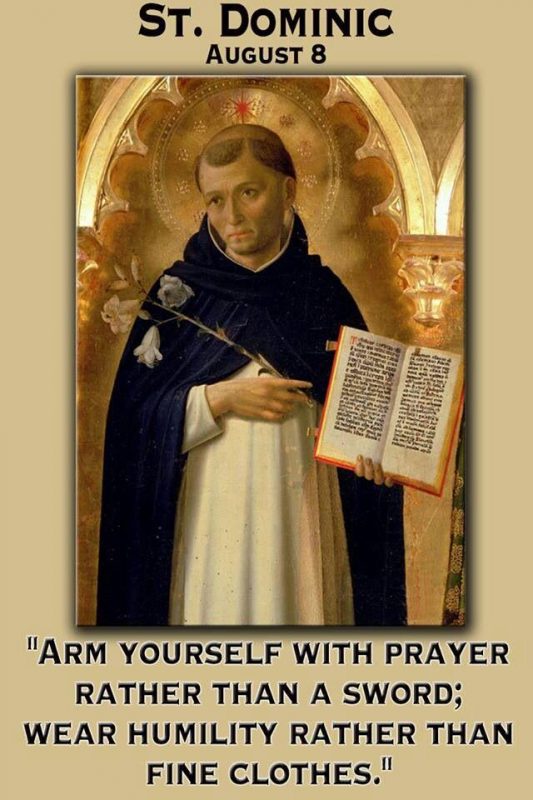written by Kate Hennessy-Keimig
Today is the feast of Dominic de Guzman, a Castilian priest and the founder of the Dominican religious order also known as the Order of Preachers.
Like us, Dominic was formed and shaped by the impacts and influences of his life circumstances as well as the events in the larger world of his time. Dominic was born in 1170 to wealthy, devout parents in the Castilian region of Spain. His uncle, an archbishop, influenced his religious development, as did his parents, especially his mother who was herself beatified by the church.
He was well-educated, spending time at the University of Palencia studying Theology and the Arts. At the age of 21, his focus shifted when Spain experienced a devastating famine. Dominic responded by giving away his money, selling his clothes, furniture and even his parchment manuscripts to feed the hungry. He is quoted as saying, “I could not bear to prize dead skins, when living skins were starving and in need.” At 24 Dominic became a Benedictine monk and six years later became the prior of the order.
Dominic’s vocation was impacted by events in the world and the church, especially the church’s response to the Cathars, a religious sect in France, who rejected the traditional Roman Catholic Church and openly challenged many of its core beliefs and practices. The Cathars believed in a dualistic cosmology that partially adapted Catholic thought into a religion of their own, and they were considered heretics by the church. The Cathars practiced an extreme ascetism, rejecting anything they considered physical or worldly and they viewed the Catholic Church as corrupt. As can be imagined, this brought them into conflict with the church, which in turn saw them as a threat.
The church initially responded by sending monks, including Dominic, to try to convert them back to Catholicism. Dominic believed that in order to have any hope of success in his mission, he needed to approach the Cathars on their own terms, coming to them as one who lived his own simple, ascetic life, passionate about his own beliefs, knowledgeable and articulate in his arguments. As he pursued his mission, Dominic began attracting followers, other men who were willing to live as itinerant beggars while holding themselves to high standards both intellectually and spiritually.
As tends to be true with saints, there are a lot of stories told about Dominic. One that appears frequently is a story about how, during his time trying to convert the Cathers he spent an entire night talking to an innkeeper, and as the story goes, by morning the man had been convinced and converted. As will all holy myths, we can not be sure how “true” the story is, but it still makes me think, and to wonder, if it did happen as reported, just what that conversation was like. I like to imagine that Dominic’s evangelism was not of the badgering sort, that he was not confrontational but curious. I like to imagine that he listened deeply to the Cather innkeeper, that he found places where there was a connection, maybe even an agreement about something, some common ground, perhaps in their commitment to a simple life, to authentically lived beliefs. I see Dominic as completely present and engaged, first listening and then passionately and articulately sharing his own story. In other words, I imaging Dominic doing good evangelism.
For two years, Dominic and the others who joined him worked among the Cathars, and in actual numbers converted, Dominic and the brothers were not very successful. It seems though. From reading the the rule he later developed for his order, Dominic had some useful insights about evangelism. In the early constitutions of the Order, Dominic exhorts his followers to “Behave as gospel men, following in the footsteps of the Saviour, speaking to God or of God, among yourselves or with your neighbours.” In other words, walk the walk. By all means, do talk about God and God’s love, but also act in such a way that others might see those beliefs in action.
Over the past few years, the Episcopal church is re-focusing on evangelism under the leadership of our Presiding Bishop who, has been inviting us all to join “the Jesus Movement,” and to find ways to manifest the Beloved Community that God envisions. As Presiding Bishop Curry reminds us:
“Evangelism – as part of the Jesus Movement – is about sharing the journey into a deeper relationship with God and with each other, and not about us controlling the end result. It’s not increasing our market share, and it’s not just propping up the institution. If we believe the relationship with a living God does matter, and that loving relationship with each other matters, then evangelism and anything that helps us to come closer as human children of God matters.”
We are encouraged to share our stories with one another, to literally “proclaim the Good News” of God’s love for all, and then to link that proclamation to acts of love and justice. We are encouraged to directly invite others into the community and to make them welcome at the feast that God puts before us.
As we reflect on the words of today’s reading from Romans, we might take Dominic’s statement, which remains in the Dominican constitutions to this day, as a guide. The “beautiful feet” of those who bring the Good News are called not just to lip service but to a living example, not to argument or heated rhetoric, but to “walking the walk” of creating God’s dream for a peaceful and just world.
The Rev. Kate Hennessy-Keimig is a bi-vocational priest and psychologist who serves in the Diocese of Nebraska.

